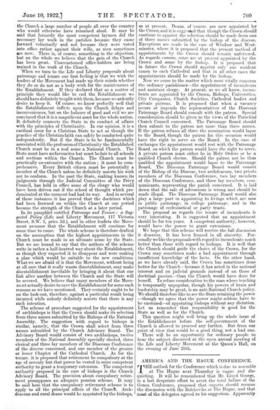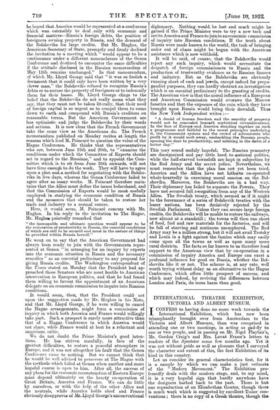AMERICA. AND THE HAGUE CONFERENCE. T HE outlook for the Conference
which is due to assemble at The Hague next Thursday is vague and dis- quieting. It will be remembered that Mr. Lloyd George, in a last desperate effort to avert the total failure of the Genoa Conference, proposed that experts should resume the discussion with the Bolsheviks at The Hague, and that most of the delegates agreed to his suggestion. Apparently he hoped that Americawould be represented at a conferenoe which was- ostensibly to deal:, only with: economic and financial matters,Russia's foreign debts, the position of foreigners, owning. property in Russia; and the- demand of the Bolsheviks for large credits. But Mr. Hughes, the American.Seeratary- of State, promptly and firmly declined the. invitation .to a meeting which " would appear to be- a continuance under a different nomenclature of the Genoa Conference and destined to encounter the same difficulties if the attitude disclosed in the Russian memorandum of May 11th remains unchanged."' In that memorandum, of which Mr; Lloyd George said-that " it. was sorfoolish a -document that it could only have• been: written by a. very clever man," the Bolsheviks.-refused to recognize Russia's debts or to.restore the:property of foreigner& or-.to indemnify them fora their losses. Mr. Lloyd- George- clings; to the belief that the Bolsheviks do not really mean what they say, that they moat, not be taken literally, that. their need of foreign capital is: so urgent as to compel them. to come down to earth and compound with Russia's, creditors on reasonable, terms*, But the American Government are less optimistic- and, judge the Bolsheviks by their. words and actions,. It. is now -clear that the French Government take the same view as the Americans do. The French memorandum,. published on Monday recites at. length the reasons which. lead M., Poincare to question the value of the Hague: Conference He thinks that the representatives who are, between June 15th and 20th, to. " examine the conditions. under which: the Committee- of •. Experts. should act in regard to- the- Russians," and to appoint the Com., mittee which, is to-.sit from-. June- 26th onwards, will not have time enough to do the work. They will have to agree upon a .plan, and-a. method for negotiating with-the-Bolshe= viks in five. days,. whereas the Genoa: Conference failed to -agree after: se-many -weeks. M. Poincare therefore main- tains that the Allies- must define the issues beforehand; and that the Commission of Experts would- be- most usefully employe& in.- studying the economic condition of Russia and the measures that should be taken to, restore- her trade- and: industry, to a normal course.
Here, it would. seem, M. Poincare concurs with Mr. Hughes. In his. reply to the invitation to- The: Hague, Mr. Hughes. pointedly remarked that " the -inescapable and- ultimate question- would appear to be the restoration .of productivity in Russia, the essential conditions of which are, atill to be secured and must in the nature-of things be provided within, Russia herself."
He went. on. to, say that the American Government- had always been ready. to join with the Governments repre- sented: at Genoa. "in arranging for an inquiry by experts into- the economic. situation in Russia and, the necessary remedies " as an essential preliminary to any proposal for gi,ving Russia, credits. The Washington correspondent of the Times - stated on Monday that the President had ap- proached those. Senators who are most hostile to. American intervention, in European politics, and that• he had found them willing to. favour the appointment of an--American delegate oman.economic commission to inquire into Russian conditions- It seem,, then, that the President could, act upon the suggestion made by Mr. Hughes in his Note, and that M. Lloyd George, if he were willing to cancel the Hague arrangements,. might form a commission of inquiry in which both America and France would willingly take part,. Such &prospect is surely more attractive than that of a. Hague, Conference in which America would not share, while France would at best be a reluctant• and suspicious: critic.
We do not doubt the Prime Minister's good inten- tions. He: has. striven manfully, in face of the greatest difficulties, to restore a peaceful atmosphere in Europe, and it was not altogether his fault that the- Genoa Conference came to nothing. But we cannot think that he would be well advised to persevere at The Hague with the methods which, failed, at Genoa when another and mere hopeful course is open to him. After all, the success of any plans for the economic reconstruction of Eastern Europe muat depend ultimately on the hearty co-operation of Great- Britain,: America and France. We can do little by ourselves,. or with the help of the other Allies and the neutrals, while America holds aloof and France obviously disapproves of Mx. Lloyd George's unconventional diplomacy:; Nothing-.would be lost and- Much might be- gained if the. Prime;-Minister were to- try a- new tack, and invite America-and France to joinin =economic commission of inquiry: into Russian conditions: 1T . the-. tenth about Russia .were made knownto -the world,. the task,of bringing order out of chaos might- be begun-. with. the American assistance which is-nova -withheld:.
It will be- said, of course,. that- the Bolsheviks would reject any- such. inquiry, which would necessitate the despatch of foreign commissioners: to Russia and the production of trustworthy- evidence as-. to Russian: finance and industry. But as the- Bolsheviks; are obviously running short of cash and jewels; except indeed for propa- gandist purposes, .they'can hardlyobstruct an investigation which is an: essential preliminary to the granting.of credits. The-American-view is that the moral influence of a European and American Commission would: overawe the Moscow fanatics and that the -exposure of the; ruin which:they have brought upon- Russia: would bring their downfall.. Thus the New York Independent writes,:- " A denial - of human.- freedom and- the sanctity' of property would not be concealed: beneath sophistical' circumlocutions. In the face of Europei and_ America standing together on such a programme-and faithful to the moral principles underlying it,. the Communist-system and- the crowd'. of 'adventurers who profit by- it would melt -away,- unahaokling the Russian people, opening.i-the door to productivity, and ushering in the dawn of a better. day:" This may sound undtlly hopefull. The Russian peasantry are- disorganized and ;pay little heed, to auational politics, while the lialfrstarved' townsfolk are kept -in subjection by the Red Army and the secret police:- Nevertheless, we must remember that the plan ha& not.: yet been: - America and- the . Allies, have, not. hitherto coroperated wholeheartedly. -in. exercising. moral suasion:. on. the . Bola sheviks. Moreover; the- Bolsheviks are . in a bad- way. Their: diplomacy has failed: to; separate. the Powers.. They have not :secured full. recognition: from, any of. the :Western Allies.. The. Swedish treaty, whickseemed as.lif it. might be. the forerunner of &series of: Bolshevik. treaties with_the lesser-- nations, has; been decisively rejected by the Swedish Parliament. Unless they can secure. large foreign credits, the. Bolsheviks will be unable to restore the railways, now almost -at a standstill ; the towns will then run short of- food, fuel and:raw materials for .the factories, and will be full of starving, and. mutinous unemployed. The Red Army may be a million strong, but it will not- avail Trotsky and Lenin in a fight against the famine. hich may easily come upon all the towns.. as- well . as upon- many more rural districts, The facts so. far known to. ua.therefore lend support to the American view that by ca-operation.in a commission of inquiry America. and Europe can exert a profound influence for good on. Russia, whether the Bol- sheviks- like it or not. The scheme is,. at .any rate, well worth:trying.without delay as. airalternative,to the Hague Conference, which - offers. little. prospect of • success, and which: may indeed,, by reviving the differences between London .and Paris, de more harm than good:



































 Previous page
Previous page